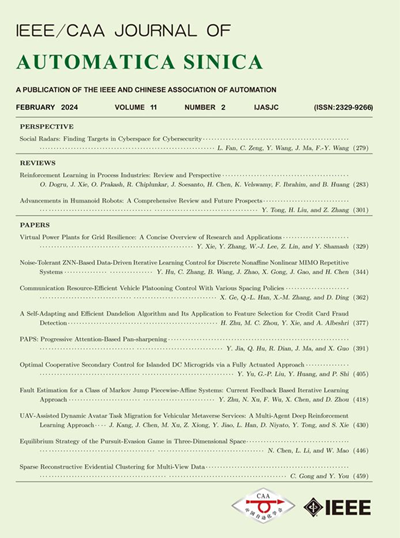Evolutionary Optimization Methods for High-Dimensional Expensive Problems: A Survey
IF 15.3
1区 计算机科学
Q1 AUTOMATION & CONTROL SYSTEMS
引用次数: 0
Abstract
Evolutionary computation is a rapidly evolving field and the related algorithms have been successfully used to solve various real-world optimization problems. The past decade has also witnessed their fast progress to solve a class of challenging optimization problems called high-dimensional expensive problems (HEPs). The evaluation of their objective fitness requires expensive resource due to their use of time-consuming physical experiments or computer simulations. Moreover, it is hard to traverse the huge search space within reasonable resource as problem dimension increases. Traditional evolutionary algorithms (EAs) tend to fail to solve HEPs competently because they need to conduct many such expensive evaluations before achieving satisfactory results. To reduce such evaluations, many novel surrogate-assisted algorithms emerge to cope with HEPs in recent years. Yet there lacks a thorough review of the state of the art in this specific and important area. This paper provides a comprehensive survey of these evolutionary algorithms for HEPs. We start with a brief introduction to the research status and the basic concepts of HEPs. Then, we present surrogate-assisted evolutionary algorithms for HEPs from four main aspects. We also give comparative results of some representative algorithms and application examples. Finally, we indicate open challenges and several promising directions to advance the progress in evolutionary optimization algorithms for HEPs.高维高成本问题的进化优化方法:概览
进化计算是一个发展迅速的领域,相关算法已成功用于解决现实世界中的各种优化问题。在过去的十年中,进化计算在解决一类具有挑战性的优化问题--高维昂贵问题(HEPs)--方面也取得了快速进展。由于使用耗时的物理实验或计算机模拟,对其目标适合度的评估需要昂贵的资源。此外,随着问题维度的增加,很难在合理的资源范围内穿越巨大的搜索空间。传统的进化算法(EA)往往无法胜任 HEPs 的求解,因为它们在取得令人满意的结果之前需要进行多次这样昂贵的评估。为了减少这种评估,近年来出现了许多新型的代用辅助算法来应对 HEPs。然而,在这一特殊而重要的领域,缺乏对最新技术的全面回顾。本文全面考察了这些针对 HEP 的进化算法。我们首先简要介绍了 HEP 的研究现状和基本概念。然后,我们从四个主要方面介绍了用于 HEP 的代理辅助进化算法。我们还给出了一些代表性算法的比较结果和应用实例。最后,我们指出了推进 HEP 进化优化算法进展的挑战和几个有前途的方向。
本文章由计算机程序翻译,如有差异,请以英文原文为准。
求助全文
约1分钟内获得全文
求助全文
来源期刊

Ieee-Caa Journal of Automatica Sinica
Engineering-Control and Systems Engineering
CiteScore
23.50
自引率
11.00%
发文量
880
期刊介绍:
The IEEE/CAA Journal of Automatica Sinica is a reputable journal that publishes high-quality papers in English on original theoretical/experimental research and development in the field of automation. The journal covers a wide range of topics including automatic control, artificial intelligence and intelligent control, systems theory and engineering, pattern recognition and intelligent systems, automation engineering and applications, information processing and information systems, network-based automation, robotics, sensing and measurement, and navigation, guidance, and control.
Additionally, the journal is abstracted/indexed in several prominent databases including SCIE (Science Citation Index Expanded), EI (Engineering Index), Inspec, Scopus, SCImago, DBLP, CNKI (China National Knowledge Infrastructure), CSCD (Chinese Science Citation Database), and IEEE Xplore.
 求助内容:
求助内容: 应助结果提醒方式:
应助结果提醒方式:


